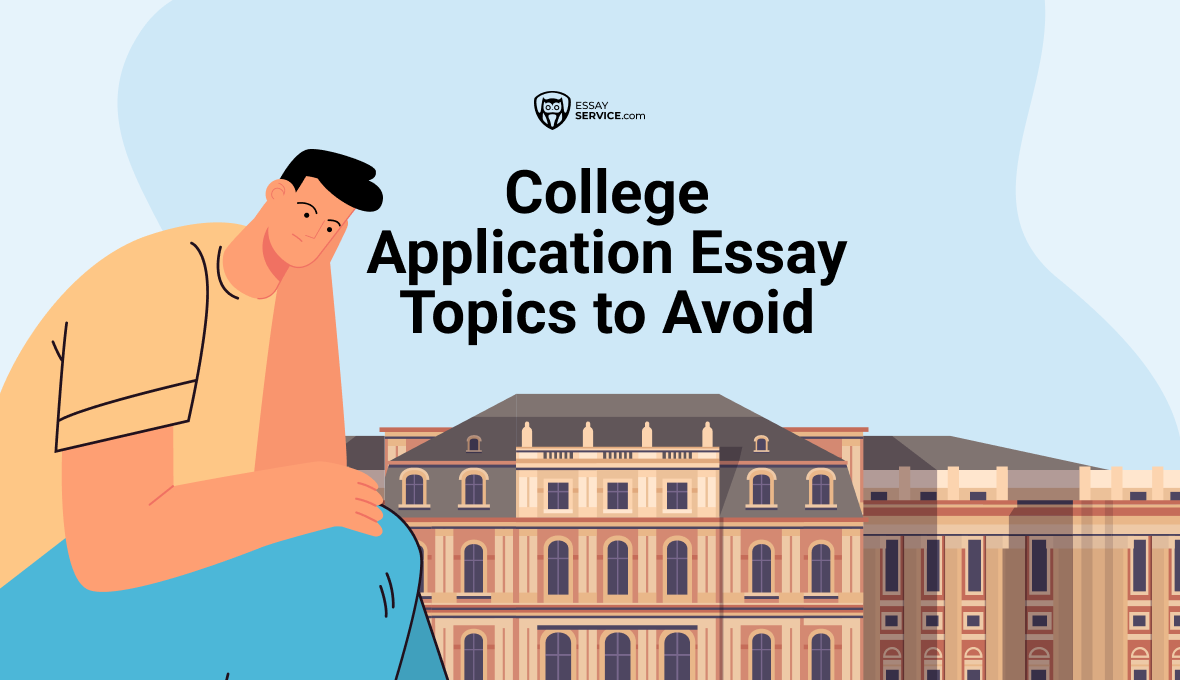
College Application Essay Topics to Avoid and What to Consider
Choosing the right topic for your college application essay is more important than most people realize. Admissions officers read countless essays each year, and the topic you pick can be the difference between standing out or blending in. A strong essay not only showcases your writing skills but also gives insight into your personality, values, and experiences. But a poor topic choice? That can cloud all of that.
Some topics, even with the best intentions, can end up hurting rather than helping your application. Whether they seem cliché, overly controversial, or just don't show the depth of who you are, there are certain college application essay topics to avoid, which weaken your essay and make it harder for you to leave a lasting impression.
In this article, we'll go over some specific topics you should steer clear of and explain why they might negatively affect your chances of getting into your dream school. By learning about what to not write about in college essays, you can focus on what really matters – presenting the best version of yourself. And if after reading this, you still feel stuck or unsure, EssayService is here to help. Our writers specialize in crafting powerful, personalized essays that will help you shine.

Top 10 College Essay Topics to Avoid: Helpful List
The Sports Victory or Injury Story
Let's be honest – sports are a huge part of many people's lives. But when it comes to applications, it's one of the common college essay topics to avoid. Stories about the big game or a serious injury have been told one too many times. Admissions officers have read countless essays on how a game was won in the final seconds or how overcoming a broken bone was the turning point in someone's life. The problem? These essays often focus more on the sport itself rather than the personal growth that came from it.
What's missing is the deeper story – what did you learn beyond the field or the court? Did you discover something new about yourself? Instead of highlighting just the win or the recovery, focus on how the experience shaped your character in a way that's unique to you. The victory or injury itself isn't as important as the lesson behind it, and that's what most of these essays fail to convey.
The Volunteer or Mission Trip Experience
Volunteer work and mission trips can be life-changing, but they've also become a common essay topic that often falls flat. Many applicants write about these experiences in a way that feels either surface-level or unintentionally self-serving, giving off a "savior complex" vibe. It's easy to end up summarizing the trip, explaining how you helped, and calling it a day. But that's not enough to make your essay memorable.
Instead, focus on a specific moment during the experience that truly challenged you or made you see things differently. What changed in your perspective? What small moment shifted the way you think or act? By avoiding generalizations and digging into the personal growth you experienced, you'll be able to craft an essay that feels more genuine and impactful.
Tragic Events or Personal Trauma
Sharing personal challenges can make for a deeply moving essay, but it's a delicate balance. Writing about tragedy or trauma runs the risk of sounding overly dramatic or, worse, self-pitying. While these experiences are undoubtedly significant, many essays focus too much on the event itself rather than the resilience and personal growth that followed.
Admissions officers want to see how you've overcome hardship, not just the hardship itself. So, if you choose to write about a difficult time, focus on how it shaped you into a stronger person. What did you learn? How did you change? Let your essay be more about your strength and less about the pain, highlighting the positive growth that came from the experience.
Controversial or Polarizing Topics (Politics, Religion, etc.)
Writing about politics or religion might seem like a bold move, but it can quickly backfire. These are deeply personal and often divisive topics. If your reader doesn't align with the views you express, you run the risk of alienating them right from the start. It's hard to win over someone who might disagree with your stance, no matter how well-written your essay is.
Instead, consider focusing on broader, less divisive themes that still show your values and perspectives. If you must address a controversial issue, aim to remain neutral or explore it in a way that invites conversation rather than drawing lines. Essays that focus on unity, understanding, or personal growth within these topics will resonate more than ones that plant a firm flag in one camp.
The "Grand Epiphany" or Sudden Realization
Essays that center around a sudden, life-changing realization might seem impactful, but they often lack the depth that admissions officers are looking for. A moment of clarity or an "aha" moment can feel forced if it's presented as the turning point for everything. Life usually isn't that simple, and these essays can end up feeling like they're trying too hard to be dramatic.
What's more compelling is a story of gradual growth. Instead of a single, instant revelation, focus on the slow, steady process of change and learning. It's these continuous moments that shape who you are over time, showing a deeper and more authentic picture of personal development.
Rehashing Your Resume or Extracurricular Achievements
Your college application already lists your accomplishments and extracurriculars, so turning your essay into a rehash of those achievements doesn't add much value. Admissions officers have already seen what you've done; now they want to know who you are. Simply listing what you've accomplished won't give them any insight into your personality, values, or how you think.
Instead, use your essay to show what your resume can't. Dive into the "why" behind your achievements. What motivates you? What lessons did you learn from those experiences that have shaped the person you've become? This is your chance to offer a glimpse of the real you beyond the bullet points.
Romantic Relationships
Essays focused on romantic relationships can feel too personal or off-topic for a college application. While love and relationships are important parts of life, they may not be the most relevant subjects when trying to convey who you are to an admissions officer. Often, these essays can come across as overly emotional or lacking the broader context that colleges are looking for.
Admissions officers are more interested in how family, friends, or mentors have influenced you. These relationships tend to offer more insight into your values, character, and personal growth. Focusing on these connections allows you to share a meaningful part of your life without straying into overly intimate territory.
Humorous or Gimmicky Topics
Humor can be a great way to engage a reader, but it's also tricky – especially in a college application essay. Humor is highly subjective, and what's funny to one person might come across as inappropriate or insincere to someone else. Essays that rely too heavily on jokes or gimmicks risk not being taken seriously, which can undermine the message you're trying to convey.
If you're naturally funny, it's fine to let a little humor shine through but use it sparingly. Make sure it doesn't detract from the overall point of your essay. The goal is to leave a lasting, positive impression, and that's hard to do if the humor overshadows your message.
Essays That Lack Focus or Are Too Generic
One of the biggest mistakes students make is trying to cover too many topics in one essay. Essays that jump from one subject to another or remain overly vague end up failing to leave any real impression. Admissions officers read hundreds of essays, so if yours feels like it's trying to say everything without saying much at all, it won't stand out.
Instead, narrow your focus. Pick one specific experience, theme, or moment that had a significant impact on you and dive deep into it. This allows you to showcase not only your writing ability but also your depth of thought and self-reflection. A focused essay makes a far stronger impression than one that tries to cover too much ground.
Travel or Study Abroad Experiences
Travel can broaden your horizons, but essays that focus on these experiences often end up feeling more like travel diaries than personal reflections. Descriptions of foreign places, cultures, or adventures can be interesting, but they don't tell much about who you are. Even worse, they can come across as privileged or superficial if the focus is on the place rather than what you learned.
If you do choose to write about travel or studying abroad, make sure the essay is centered on your personal growth, not just the destination. How did the experience change your perspective? What challenges did you face, and how did you grow from them? By shifting the focus to what the trip taught you, you can create a more meaningful and memorable essay.
How to Identify If Your Topic is Problematic?
Choosing the right topic for your essay can be tricky. But how do you know if the one you've picked is problematic? There are a few key signs that can help you figure out if your essay might be overused, too risky, or just lacking in depth.
Start by asking yourself if your topic is something you've seen or heard often. If your essay centers on a common subject, like sports victories or volunteer trips, it's worth reconsidering. Overused topics tend to blend in, and that's the last thing you want when trying to stand out.
Next, think about how risky the topic is. Controversial subjects like politics or religion can quickly turn off readers, especially if they don't share your views. You also want to avoid topics that could make your essay feel too personal or inappropriate for a college application.
Depth is another crucial factor. Does your essay focus more on the events themselves rather than what you learned from them? A list of things that happened doesn't give admissions officers much insight into who you are. The key is to show your personal growth and insights, not just the storyline.
Getting feedback from teachers or mentors can also be incredibly helpful. They've seen countless essays and can tell you if your topic feels too generic or doesn't quite hit the mark. Sometimes, a fresh pair of eyes can spot things you might have missed.
Finally, here are a few guiding questions to help you assess which topics to avoid in college essays:
- Does the essay focus more on events than personal insights?
- Is it unique, or does it feel like something anyone could write?
- Does it reflect who I am today, or does it dwell too much on past achievements or experiences?
If your topic can pass these checks, you're on the right track to writing a memorable essay that truly reflects you.
The Bottom Line
In the end, the key to a strong college application essay is avoiding overused or risky topics that could blend in with the rest or even backfire. Choosing a topic that's too common or controversial can make it harder to showcase your individuality and potential. Instead, focus on themes that highlight personal growth, reflect your values, and reveal unique experiences. Your essay should tell admissions officers something meaningful about you—something they can't learn from your grades or activities list.
If you're still feeling stuck or unsure about your topic, that's okay. Crafting the perfect essay can be challenging. Fortunately, EssayService is here to help. Whether you need assistance brainstorming ideas or fine-tuning your draft, our writers can guide you through the process and ensure your essay leaves a lasting impression.
Frequently asked questions
New posts to your inbox!
Your submission has been received!

.webp)

.png)